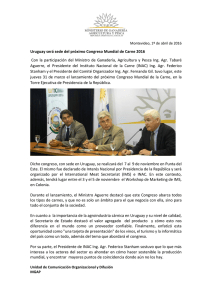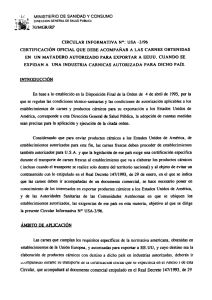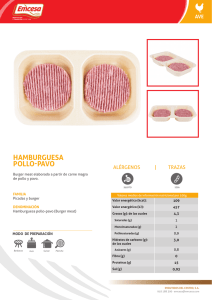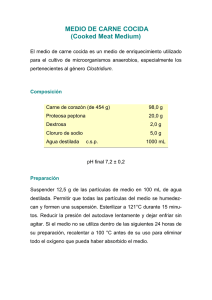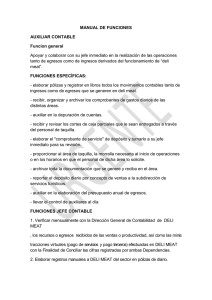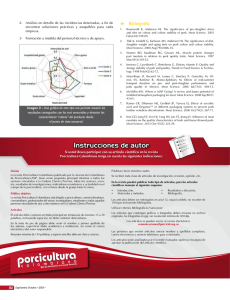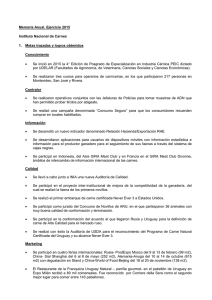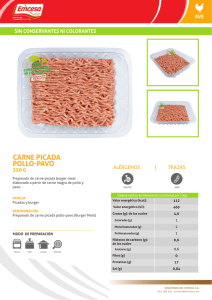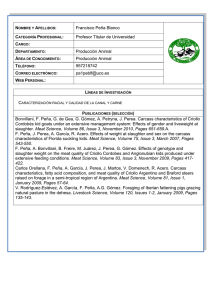Dirigida a Profesionales con Título Universitario de Grado
Anuncio
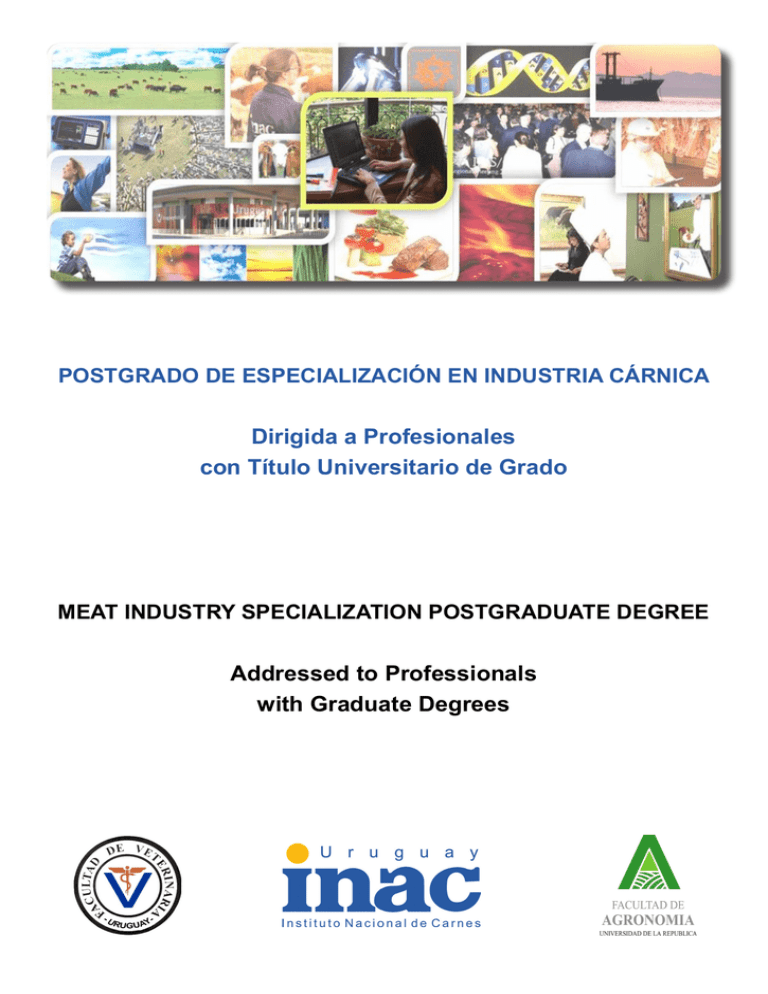
POSTGRADO DE ESPECIALIZACIÓN EN INDUSTRIA CÁRNICA Dirigida a Profesionales con Título Universitario de Grado MEAT INDUSTRY SPECIALIZATION POSTGRADUATE DEGREE Addressed to Professionals with Graduate Degrees POSGRADO DE ESPECIALIZACIÓN EN INDUSTRIA CÁRNICA DIRIGIDA A PROFESIONALES CON TÍTULO UNIVERSITARIO DE GRADO POSGRADUATE SPECIALIZATION ON MEAT INDUSTRY INTENDED FOR UNIVERSITY GRADUATES NATIONAL MEAT INSTITUTE AND UNIVERSITY OF THE REPUBLIC URUGUAY INSTITUTO NACIONAL DE CARNES Y UNIVERSIDAD DE LA REPÚBLICA Suma Summary 1. Purpose and Objectives 2. Structure and Organization 3. Evaluation 4. Degree and Requirements 5. Professors and Specialists 6. Tuition 1. Finalidad y Objetivos 2. Estructura y Organización 3. Evaluación 4. Título y Requisitos 5. Docentes y Especialistas 6. Matrícula FINALIDAD Y OBJETIVOS 1.1. Pertinencia y Finalidad 1 PURPOSE AND OBJECTIVES 1.1. Pertinence and purpose U U El país ha debido pasar del rol de mero interlocutor en la producción de conocimiento a tener que ocupar, por la fuerza de los hechos y el agotamiento de los referentes de innovación externos, al rol de creador de conocimiento en la materia. Este es un punto clave del escenario presente. Given the facts and the lack of external innovation models, Uruguay had to turn from the role of a mere speaker in the production of knowledge to the role of creator of knowledge on the matter. This is a key point of the current scenario. Uruguay sigue intentando superar sus propios logros. Ha invertido fuertemente en materia tecnológica, ha desarrollado las bases de un sistema de trazabilidad de punta, ha logrado la implantación de mecanismos de certificación de calidad obligatorios o voluntarios reconocidos por entidades de primer nivel (tales como el USDA y el British Standard Institute) y ha desarrollado estrategias de promoción y acceso a mercados que intentan superar sus propias marcas anteriores. Por otra parte, la recolección de información, su procesamiento y análisis económico son otro de los puntos fuertes de Uruguay, tanto como sus trabajos en materia de seguridad e inocuidad alimentaria cárnica. Todo ello ya está en parte operativo y en parte en vías de implementación. Uruguay keeps trying to go beyond its own achievements. It has made strong investment in technology, developed the basis of a cutting edge traceability system, managed the implementation of mandatory and voluntary quality certification mechanisms acknowledged by top level institutions (such as USDA and the British Standard Institute), and developed strategies for promotion and access to markets that intend to break its own previous records. On the other hand, collection of data, and its processing and economic analysis are some of Uruguay’s strengths, as well as its works regarding meat safety. These tasks are continuously evolving and some projects are yet to be implemented. ruguay es uno de los principales países exportadores de carne en el mundo. Su posición está sustentada por su trayectoria histórica en la materia, así como por el elevado grado de capacitación técnica de sus productores y de su industria, la existencia de un marco regulatorio estable y la conformación de un sistema de interacción entre los distintos operadores que le colocan como referente a nivel mundial. La gran apuesta de Uruguay se centra, en paralelo y con la misma fuerza, en crear competencias al más alto nivel para la especialización de profesionales universitarios vinculados con, o interesados en, la industria cárnica en general, generando así la base para un desarrollo sostenible y de primera calidad en esta materia para nuestro país. Un país cuya principal actividad exportadora refiere a la carne, no puede menos que apostar a este salto cualitativo en la creación sistemática de especialización en la materia. Por otra parte, los cambios vertiginosos de los últimos tiempos, en todas las áreas, así como la creciente complejidad de los requerimientos de los mercados internacionales, han impactado fuertemente en la necesidad de generar un “saber hacer” específico cada vez más sofisticado. La especialización propuesta pretende brindar la base para, en un futuro cercano, desarrollar mayores capacidades e innovación en la materia, colocando a Uruguay como líder mundial. Esto justifica trabajo conjunto del Instituto Nacional de Carnes (INAC) y las Facultades de Agronomía y Veterinaria de la Universidad de la República, en el marco del PEDEAGRIND en construcción (Programa de Desarrollo en Ciencias y Tecnologías Agropecuarias y Agroindustriales), para desarrollar este nuevo Posgrado Profesional: Especialización en Industria Cárnica. Esto requiere de aportes variados y complejos desde la esfera pública y privada, con un rol impulsor central del INAC. En resumen, la finalidad perseguida es lograr profesionales universitarios especialistas con un elevado grado de perfeccionamiento en el dominio del tema “Industria Cárnica” dentro de las profesiones o campos de aplicación de éstas, con el fin de ampliar la capacitación de los mismos. ruguay is one of the leading meat exporters in the world. Its position is supported by its historical path on the matter, and by the high degree of technical training of its farmers and industry, as well as by the existence of a stable regulatory framework, and by the formation of a system of interaction among the different actors. As a result, the country is globally regarded as a model. At the same time and with the same strength, Uruguay’s major goal is focused in creating the highest qualifications for the specialization of graduate professionals related to or interested in the meat industry in general, thus generating the basis for a sustainable and top quality development on this matter for our country. A country whose main exporting activity is related to meat cannot but to bet on this qualitative leap as to the systematic creation of specialization on the matter. On the other hand, the vertiginous changes of recent times in all areas, as well as the growing complexity of the requirements of international markets, have had strong impact on the need for the generation of a specific “know-how” more and more sophisticated. The proposed specialization intends to supply the basis to develop greater capacities and innovation on the matter in the near future, thus Uruguay being placed as a world leader. This justifies the joint effort between the National Meat Institute (INAC) and the Colleges of Agronomy and Veterinary Medicine of the University of the Republic of Uruguay, to develop this new Professional Posgraduate Program: Specialization in Meat Industry. This requires a variety of contributions from public and private institutions, with a central role of INAC. In summary, the purpose is to specialize university graduates coming with diverse undergraduate trainings in the mastering of the “Meat Industry” subject with a view to broaden their professional perspectives. ........................................................................................................................................................................................................................................... EIC 1 1.2. Objetivos 1.2. Objectives A) Profundizar el conocimiento de los distintos aspectos de la producción, comercialización, análisis económico, requerimientos de marco regulatorio y demás aspectos relacionados con la industria cárnica a nivel nacional e internacional. Se busca que esto redunde no sólo en un mejor desempeño profesional, sino en una mejora del sistema todo. A) To deepen the knowledge about the different aspects of production, trading, economic analysis, requirements of the legal framework and other aspects related to the meat industry, at national and international level. The purpose is that this benefits not only a better professional performance, but also an improvement of the whole system. B) Fortalecer la industria cárnica, producto de un enfoque actualizado y de la correcta interpretación y utilización del estado actual de la materia. B) To strengthen the meat industry, as consequence of an updated approach, and of the correct interpretation and use of the current state of affairs. C) Cimentar las bases que sustenten en el largo plazo, en forma sistemática, la investigación y generación de conocimiento en esta materia. C) To consolidate the basis that systematically support in the long term the research and generation of knowledge on this matter. D) Fortalecer la comunidad científica nacional en el área definida y generar vínculos duraderos con la comunidad científica y técnica internacional. D) To strengthen the national scientific community of the defined area, and generate lasting links with the international scientific and technical communities. 1.3. Condiciones de Admisibilidad 1.3. Conditions of Admissibility La especialización está dirigida a personas con título universitario de grado, que puedan aprovechar esta formación desde diferentes ángulos, logrando una visión integral del tema. The specialization is intended for university graduates, who can benefit from this training from different angles, thus achieving an integral view of the subject. Como política se tenderá a asegurar la participación de un porcentaje relevante de egresados universitarios no vinculados aún a la industria cárnica o a la esfera pública, de modo de abrir este campo de especialización a jóvenes profesionales asegurando la transmisión intergeneracional del conocimiento en esta área clave para el país. As a policy, participation of a relevant percentage of university graduates not yet related to the meat industry or the public sector will be encouraged, in a way to open this field of specialization to young professionals, thus ensuring the intergenerational transmission of knowledge in this area, which is a key area to the country. Los aspirantes deberán presentar su solicitud por correo electrónico a la siguiente dirección: especializacion@inac.gub.uy, completando el formulario que encontrarán en la página Web de INAC. Existirá un cupo limitado y el proceso de admisión pondrá especial énfasis en los antecedentes del postulante. Candidates must submit their applications through email to the following mailbox: especializacion@inac.gub.uy, attaching the form that appears on INAC’s webpage, filled in. There will be a limited quota and the admission process will be particularly focused on the background of candidates. Todas las solicitudes serán analizadas por un Tribunal de Admisión, conformado por tres expertos, quienes podrán mantener entrevistas con los aspirantes. All the applications will be analyzed by an Admission Board, composed of three experts, who may interview candidates. 1.4. Perfil del Egresado 1.4. Profile of graduates El egresado de la especialización en industria cárnica habrá desarrollado y adquirido las siguientes competencias: Graduates of the meat industry specialization will have developed and acquired the following abilities: A) Tendrá la aptitud de analizar los diversos casos que se le planteen o la realidad en general de la industria cárnica, partiendo de conocimientos profundos a través de una visión global de la situación en Uruguay y el exterior. A) They will be able to analyze the different cases that are presented to them or the reality of the meat industry in general, based on deep knowledge and having a global view of the situation in Uruguay and abroad. B) Será capaz de analizar los cambios con repercusión en la práctica industrial, económica y comercial en materia de carnes. B) They will be able to analyze changes affecting the industrial, economic and commercial practice as regards meats. C) Sabrá cómo aplicar distintos métodos y técnicas, contando con la aptitud para utilizar tal instrumental, en todos los aspectos relevantes de la actividad del sector cárnico desde diversas posiciones en la cadena. C) They will know how to apply different methods and techniques, having the capacity to use said instruments, in all the aspects relevant to the meat sector from the different links of the chain. D) Estará en condiciones de involucrarse activamente en abordajes interdisciplinarios de los distintos problemas que se le planteen, aportando sus conocimientos especializados. D) They will be able to actively involve themselves in interdisciplinary approaches of the various problems that may arise, by contributing with their specialized knowledge. ........................................................................................................................................................................................................................................... EIC 2 ESTRUCTURA Y ORGANIZACIÓN 2.1. Módulos y Actividades 2 La Especialización se estructura en cuatro módulos. Cada módulo se desarrollará en un período de cuatro meses en una versión en extenso. En la versión intensiva el total de las actividades presenciales se desarrollan en tres meses y el total de las actividades (incluyendo la elaboración y entrega de monografía) en diez a doce meses. Cada módulo se integra con tres tipos de Actividades: A) Actividades de estudio previas y personales, a partir de la bibliografía que estará disponible para los estudiantes, siendo asistidos mediante un sistema de consulta a los docentes encargados de los módulos o cursos o actividad de campo específica. STRUCTURE AND ORGANIZATION 2.1. Modules and Activities The Specialization will be structured in four modules. Each module will be developed in a period of four months in the extended attendance option. In the intensive attendance option shall be developed in three months and the total activities (including development and delivery the four monographs) in a total of ten up to twelve months. Each module is integrated with three kinds of activities: A) Individual activities of study based on the booklist available for students, who will be able to query teachers in charge of modules or courses or specific field activities. B) Actividad presencial de salón por cada uno de los cursos. Algunos de los cursos, o parte de ellos, podrán ser impartidos bajo la metodología de educación a distancia. B) In-class activities per each course. Some of the courses, or part of them, may be distance courses. C) Actividades de campo. C) Field activities. D) Elaboración de una monografía correspondiente a cada módulo. D) Preparation of a monograph for each module. La coordinación de los módulos corresponderá a docentes a cargo de los mismos. Coordination of modules will be the responsibility of head teachers of the modules. 2.2. Estructura de los Módulos 2.2. Module structure A) Apertura del Módulo. El módulo comenzará en la fecha de inicio fijada, momento en el cual el coordinador presentará a través de la Web de INAC un documento de apertura indicando: i) materiales, documentos y bibliografía, ii) programas de los cursos, actividades especiales y de campo que conforman el módulo y iii) cronograma con las fechas concretas de cumplimiento del plan del módulo. A) Module opening. The module will begin at the established beginning date, moment in which the coordinator will present on INAC’s Web an opening document stating: i) materials, documents and booklist, ii) course programs, special activities and field activities of the module, and iii) schedule with the dates for the fulfillment of the module plan. B) Actividad Individual. Incluye el estudio de los materiales indicados en el documento de apertura y las consultas personales realizadas a los docentes, las cuales se canalizarán a través de un único punto de contacto; vía correo electrónico, foro virtual o sesiones personales, en caso que así se estime necesario. B)Individual activity. It includes the study of materials stated in the opening document and queries made to teachers, which will be channeled through a single contact point, email, virtual forum or personal sessions, if deemed necessary. C) Actividad Presencial. Esta actividad se concentrará en los Cursos y otras actividades indicadas en el Documento de Apertura de cada Módulo. Cada coordinador de módulo organizará la actividad presencial, integrando a los profesores y especialistas que entienda pertinente. En la versión de actividad presencial en extenso las pautas horarias para la actividad presencial serán las siguientes: i) los cursos se desarrollarán los viernes de 18:00 a 21:00 horas y los sábados de 9:00 a 12:00 horas y de 13:00 a 16:00 horas, y ii) 4 a 6 actividades de campo, definidas como visitas, conferencias y simposios, en días hábiles (lunes a viernes), pudiendo abarcar el día completo (mañana y tarde) en locaciones fuera de Montevideo. En la versión de actividad presencial intensiva la misma se concentra en tres meses con sesiones que serán de cuatro a ocho horas por día. C) In-class activity. This activity will be focused on courses and other activities stated in the Opening Document for each Module. Each module coordinator will organize the in-class activity, integrating the teachers and specialists the coordinator deems proper. In the extended attendance option the time tables for the in-class activity will be as follows: i) courses will be given on Fridays from 6:00 pm to 9:00 pm, and on Saturdays from 9:00 am to 12:00 pm and from 1:00 pm to 4:00 pm, and ii) 4 to 6 field activities, defined as visits, lectures and conferences, on working days (Monday through Friday), these lasting a full day (morning and afternoon) at locations outside Montevideo. In the intensive attendance option the courses will be concentrated in three months with sessions that will be four to eight hours per day. D) Monografía. Esta actividad consiste en la elaboración de una Monografía sobre alguno de los temas tratados en el módulo. Se realizarán individualmente o por grupos de hasta tres estudiantes, que formularán una propuesta de tema para el trabajo monográfico, así como sus objetivos, que deberá ser aprobada por el coordinador del módulo. D) Monograph. This activity consists in the preparation of a monograph on any of the subjects addressed during the module. The monographs be developed individually or in groups of up to three students, who will propose a subject for the monograph, as well as its objectives, and this must be approved by the module coordinator. El Plan de la Especialización, así como cada módulo, presenta una estructura flexible que permite ajustes según los enfoques del docente. The Specialization plan, as well as each module, has a flexible structure that makes it possible to make adjustments in accordance with the approaches of teachers. ........................................................................................................................................................................................................................................... EIC 3 2.3. Calificaciones Se utilizarán cuatro calificaciones: Calificación Puntos Estatus A 90 a 100 Aprobado B 80 a 89 Aprobado C 70 a 79 Aprobado D Menos de 70 Reprobado Grade Ponits Status A 90 a 100 Pass B 80 a 89 Pass C 70 a 79 Pass D Less than 70 Fail 2.3. Grades There will be four grades: 2.4. Sistema de Créditos La unidad de medida de las actividades de la Especialización es el Crédito. Cada crédito equivale a 15 horas de trabajo del estudiante, necesario para una adecuada asimilación de las asignaturas tratadas, incluyendo actividades presenciales, trabajo asistido y trabajo individual. Los créditos se adjudican de la siguiente manera: Por Módulo Total Especialización Actividad Créditos Horas Créditos Horas Individual 5 75 20 300 Cursos 3 45 12 180 Campo 2 30 8 120 Monografía 5 75 20 300 Total 15 225 60 900 Presencial 2.4. Credit System The measuring unit for Specialization activities will be the Credit. Each credit equals 15 hours of student’s work, needed for a proper assimilation of the subjects addressed, including in-class activities, assisted homework, and individual work. Credits will be awarded as follows: Per Module Activity Individual Specialization Total Credits Hours Credits Hours 5 75 20 300 Courses 3 45 12 180 Field 2 30 8 120 Monograph 5 75 20 300 Total 15 225 60 900 In-class ........................................................................................................................................................................................................................................... EIC 4 2.5. Estructura de Cursos por Módulos Módulo I II Temario Política de Carnes y Marco Regulatorio Productos y Procesos de la Industria Frigorífica • • • • • La Política Nacional de Carnes en Uruguay. Marco regulatorio Nacional. Marco regulatorio Internacional. Negociación Internacional y comercio exterior. Políticas públicas y análisis estratégico. • • • • • Tecnologías de los procesos de producción. Diseño de plantas. Refrigeración y cadena de frío. Trazabilidad, Sistema Electrónico de Información de la Industria Cárnica (SEIIC). Aspectos ambientales y Cambio Climático. III Calidad e Inocuidad Alimentaria • • • • Bienestar Animal. Estándares de Calidad de la carne. Inocuidad alimentaria. Certificaciones obligatorias y voluntarias. IV Economía y Negocios en la Cadena Cárnica • • • • Agronegocios en las cadenas cárnicas del Uruguay. Desempeño económico de la industria frigorífica. Comercio Mundial de Carnes. Estrategias de Marketing de las Carnes. 2.5. Course structure per module Module I II Subjects Meat policy and regulatory framework Products and processes of the Meat Industry III Food safety and quality IV Economics and business operations in the meat chain • • • • • The national meat policy in Uruguay. National regulatory framework. International regulatory framework. International negotiation and foreign trade. Public policies and strategic analysis. • • • • • Technologies of production processes. Plant design. Cooling systems and cold chain. Traceability, Electronic Information System for the Beef Industry (SEIIC). Environmental aspects and Climate Change. • • • • Animal welfare. Meat quality standards. Food safety. Mandatory and voluntary certifications. • • • • • Agribusiness in the Uruguayan meat chains Economic performance of the meat industry Addition of value: changing of products and processes Global meat trade Meat marketing strategies ........................................................................................................................................................................................................................................... EIC 5 Módulo I - Política de Carnes y Marco Regulatorio Module I - Meat policy and regulatory framework Se analiza el proceso de desarrollo del sector cárnico, precisando las relaciones causales entre las políticas, marco institucional y regulatorio. Se plantea la necesidad de fortalecer el pensamiento estratégico y prospectivo para diseñar políticas en el sector que permitan una inserción en el nuevo contexto internacional. Se abordan temas conceptuales y funcionales de política comercial y negociaciones comerciales. The process of meat sector development is analyzed, the causal relations between policies and the institutional and regulatory framework being specified. The need to strengthen the strategic and prospective thinking to design policies for the meat sector allowing for insertion in the new global context is set out. Conceptual and functional issues concerning commercial policy and trading negotiations are addressed. Módulo II - Productos y Procesos de la Industria Frigorífica Module II - Products and processes of the Meat Industry Se analizan las distintas etapas de producción en la Industria Cárnica, desde la faena y desosado, hasta los diferentes procesos que incorporan valor a la materia prima original. Se destaca la importancia del diseño en el marco de la Industria y la interacción de diferentes disciplinas técnicas. Asimismo se hace referencia a las buenas prácticas operacionales que inciden en la calidad de los productos obtenidos y en los rendimientos de los diferentes procesos. Se evalúan los avances tecnológicos, su vinculación con el diseño, los procesos industriales y los productos obtenidos. The different production stages of the Meat Industry are analyzed: from slaughter and deboning up to the different processes adding value to the original raw material. The importance of design in the framework of the Industry and of the interaction with different technical disciplines is stressed. Likewise, good operational practices affecting the quality of products obtained and the output of the different processes are discussed. Se estudia la Tecnología de la Refrigeración aplicada a la Industria Cárnica, en tanto que incide en la transformación de las reses faenadas, en la inocuidad y calidad de los alimentos que se elaboran. Se complementa la información abordando en forma general los aspectos de seguridad en las instalaciones frigoríficas y las normas básicas correspondientes. Se trata el tema de Trazabilidad y se analiza el Sistema Electrónico de Información de la Industria Cárnica (SEIIC), su modelo conceptual y su evolución en el tiempo. Technological advances are evaluated, as well as their links with design, industrial processes and products obtained. Módulo III - Calidad e Inocuidad Alimentaria Module III - Food safety and quality Comprende temas que están directamente vinculados al área de la Ciencia y Tecnología de la Carne, aplicables tanto al mercado interno como a la comercialización externa, ya que integran una lista de requisitos presentes y futuros exigidos por los países compradores. Se abordan temas tales como el “Bienestar Animal”, la “Inocuidad Alimentaria” y la “Certificación”. El concepto actual de Calidad de las Cadenas Alimentarias tratado en éste módulo, está directamente vinculado a los temas antes citados siendo el proceso de Certificación la herramienta que tiene como objetivo principal maximizar el valor agregado de la carne y productos cárnicos. This module addresses issues that are directly related to the area of Meat Science and Technology, which are applicable both to the domestic market and to exports, and which make up a list of current and future requirements demanded by purchasing countries. Subjects addressed are subjects such as “Animal Welfare”, “Food Safety” and “Certification”. The current concept of Food Chain Quality discussed in this module is directly related to the abovementioned subjects, the certification process being the tool whose main objective is to maximize the added value of meat and meat products. Módulo IV - Economía y Negocios en la Cadena Cárnica Module IV - Economics and business operations in the meat chain El objetivo de este módulo es presentar al estudiante una visión general de los negocios en las cadenas de carnes rojas en Uruguay. Se revisan indicadores de eficiencia de los sistemas productivos pecuarios y se estudia la ecuación básica de costos en la industria frigorífica, vinculándola con el análisis de rentabilidad y riesgo. The aim of this module is to present to students an overview of business operations in the red meat chains of Uruguay. Efficiency indicators of livestock production systems are revised, and the basic cost equation in the meat industry is analyzed, it being linked to a risk and profitability analysis. As an introduction to the insertion of Uruguayan meats into the international market, global movements of the world meat trade are analyzed. The added value is a subject Como introducción al tema de la inserción internacional de las carnes uruguayas se analizan los movimientos globales del comercio mundial de carnes. Un tópico que recibirá especial atención dentro del módulo es el de agregado de valor, tanto a través de la modificación de productos y procesos como a través del posicionamiento de la marca país en la estrategia de marketing que impulsa el INAC. EVALUACIÓN Cada Módulo se aprobará mediante: i) asistencia de al menos un 75% de la actividad presencial y ii) aprobación de la Monografía correspondiente. En consecuencia, la Especialización se aprobará con la acumulación de un total de 60 créditos. that will be given special attention within this module, both through the modification of products and processes, and through the positioning of the country brand in the marketing strategy boosted by INAC. 3 EVALUATION Each module will be passed on fulfillment of the following conditions: i) at least 75% attendance to in-class activities and ii) passing grade for the corresponding monograph. Therefore, passing credits for the Specialization sum up a total of 60 credits. ........................................................................................................................................................................................................................................... EIC 6 TÍTULO Y REQUISITOS 4 A los estudiantes que hayan completado satisfactoriamente todos los requisitos de evaluación se les entregará un certificado de aprobación del módulo que hará constar que el mismo equivale a 15 créditos de postgrado de la UDELAR (60 créditos son los requeridos para el Diploma de Especialización). A los estudiantes que hayan aprobado los cuatro módulos, las Facultades de Agronomía y Veterinaria junto con INAC, expedirán un Diploma en Especialización en Industria Cárnica como postgrado de la UDELAR. DOCENTES Y ESPECIALISTAS 5 DEGREE AND REQUIREMENTS Students having successfully fulfilled all the evaluation requirements will be awarded a passing certificate for the module that will be equivalent to 15 postgraduate credits of University of the Republic (60 credits are required for the Certificate of Specialization). Students having passed the four modules shall be awarded by the Schools of Agronomy and Veterinary of the University of the Republic together with INAC a Diploma in Meat Industry Specialization as a postgraduate of the University of the Republic diploma. PROFESSORS AND SPECIALISTS La Especialización contará con docentes y especialistas nacionales y del extranjero. A continuación se presenta una lista de Profesores y Especialistas que participaron en ediciones anteriores: The specialization will have Uruguayan and foreign professors and specialists. A list of professors and specialists participating in previous editions are: Docentes Nacionales: Uruguayan teachers: • Daniel Abraham. • Ing. Agr. Jorge Acosta • Dra. Ana María Amorín. • Ing. Agr. Gianni Bianchi • Cra. Silvana Bonsignore • Ing. Agr. Pablo Caputi • Ing.Agr. Miguel Carriquiry • Dr. Gastón Casaux • Dr. Luis Castro • Dra. Viviana Cervieri • Dr. Carlos Correa • Dr. Gabriel Costas • Ing. Agr. Felipe D’Albora • Gregorio Dassatti • Dr. Juan Franco • Dr. Oscar Feed • Ing. Agr. Ruy Gil • Cra. Valentina Herrera • Dr. José Ibarlucea • Dr. Juan José Imelio • Ing. Hugo Köncke • Dr. Héctor Lazaneo • Ing. Agr. Juan Lema • Dra. Cristina López • Arq. Diego Mateo • Ing. Alm. Carlos Méndez • Ing. Agr. Gabriel Osorio • Cra. Raquel Pol • Dr. José Luis Repetto • Dr. José Robaina • Dr. Fernando Rovira • Dr. Marcel Vaillant • Dr. Miguel Vassallo • Ing. María del Carmen Vilanova • Daniel Abraham • Ing. Agr. Jorge Acosta • Dra. Ana María Amorín • Ing. Agr. Gianni Bianchi • Cra. Silvana Bonsignore • Ing. Agr. Pablo Caputi • Ing. Agr. Miguel Carriquiry • Dr. Gastón Casaux • Dr. Luis Castro • Dra. Viviana Cervieri • Dr. Carlos Correa • Dr. Gabriel Costas •Ing. Agr. Felipe D’Albora • Gregorio Dassatti • Dr. Juan Franco • Dr. Oscar Feed • Ing. Agr. Ruy Gil • Cra. Valentina Herrera • Dr. José Ibarlucea • Dr. Juan José Imelio • Ing. Hugo Köncke • Dr. Héctor Lazaneo • Ing. Agr. Juan Lema • Dra. Cristina López • Arq. Diego Mateo • Ing. Alm. Carlos Méndez • Ing. Agr. Gabriel Osorio • Cra. Raquel Pol • Dr. José Luis Repetto • Dr. José Robaina • Dr. Fernando Rovira • Dr. Marcel Vaillant • Dr. Miguel Vassallo • Ing. María del Carmen Vilanova Docentes Extranjeros: Foreign teachers: • Ec. Bob Bansback. Economista, Profesor Harper Adams University College, Reino Unido. • Julio O. J. Barcellos. Médico Veterinario, Profesor de la Universidad Federal de Río Grande del Sur. • Marcelo Milani. Ingeniero Electricista UFRGS Gerente para América Latina de MAREL. • Alistair John Mackintosh Livestock Board Chairman del National Farmers Union. • Dr. PhD Kristian Möller Director General de GLOBALGAP. • Prof. PhD Frank Mitloehner. Universidad California Davis. USA • Ec. Bob Bansback. Economist, Harper Adams University College, Reino Unido. • Julio O. J. Barcellos. Veterinary, Universidad Federal de Río Grande del Sur. • Marcelo Milani. Electrical engeener UFRGS Gerente para América Latina de MAREL. • Alistair John Mackintosh Livestock Board Chairman del National. Farmers Union. • Dr. PhD Kristian Möller General Director of GLOBALGAP. • Prof. PhD Frank Mitloehner. University of California Davis.USA MATRÍCULA TUITION El costo total de la especialización se fija para cada edición y de acuerdo con la modalidad escogida (actividad presencial en extenso o intensiva). 6 The total cost of specialization is fixed for each edition in accordance with extended or intensive attendance modality chosen. Scholarships of 50 % and 100 % of the enrollment fee can be requested Se pueden solicitar becas del 50% y 100% de la Matrícula, debiendo by submitting the corresponding Scholarship Application Form. presentar el Formulario de Solicitud de Beca correspondiente. ........................................................................................................................................................................................................................................... EIC 7 Dr. Luis Alfredo Fratti Presidente del Instituto Nacional de Carnes U ruguay es uno de los principales actores en el mercado mundial de carnes. Su posición se sustenta en base a la trayectoria histórica, el grado de capacitación técnica de productores e industriales, la existencia de un marco regulatorio estable, la conformación de un sistema de interacción entre los agentes del sector, colocándola como referente internacional. La dinámica y los cambios vertiginosos de alcance global que se han sucedido en distintas áreas en los últimos tiempos, así como la creciente complejidad de los requerimientos de los mercados internacionales, han impactado fuertemente en la necesidad de generar un “saber hacer” específico cada vez más sofisticado. El país ha debido pasar del rol de mero interlocutor en la producción de conocimiento a tener que ocupar, por la fuerza de los hechos y el agotamiento de los referentes de innovación externos, al rol de creador de conocimiento en la materia. Este es un punto clave del escenario presente. Uruguay sigue intentando superar sus propios logros y ha invertido fuertemente en materia tecnológica, ha desarrollado las bases de un sistema de trazabilidad de punta, ha logrado la implantación de mecanismos de certificación de calidad reconocidos por entidades internacionales de primer nivel (por ejemplo USDA), ha desarrollado novedosas estrategias de promoción y acceso a mercados que intentan superar sus propias marcas anteriores. Por otra parte, la recolección de información, su procesamiento y análisis económico son otro de los puntos fuertes de Uruguay, tanto como sus trabajos en materia de seguridad e inocuidad alimentaria cárnica. Todo ello ya está en parte operativo y en parte en vías de implementación. La gran apuesta de Uruguay se centra, en paralelo y con la misma fuerza, en crear competencias al más alto nivel para la especialización de profesionales universitarios vinculados con, o interesados en, la industria cárnica en general, generando así la base para un desarrollo sostenible y de primera calidad en esta materia para nuestro país, procurando mantener esta posición de vanguardia que se ha iniciado. Esto justifica el impulso por parte del Instituto Nacional de Carnes, dentro de sus competencias de acuerdo al Decreto Ley 15.605, al desarrollo de una Especialización en Industria Cárnica, en alianza con la Universidad de la República y con el apoyo de organismos especializados de referencia y expertos internacionales, a cuya validación como título universitario de postgrado se apunta. Un país cuya principal actividad exportadora refiere a la carne, no puede menos que apostar a este salto cualitativo en la creación sistemática de especialización en la materia. La especialización propuesta pretende brindar la base para, en un futuro cercano, desarrollar mayores capacidades e innovación en la materia, colocando a Uruguay como líder mundial. Esta nueva época es extraordinariamente rica y estimulante, pero requiere de aportes variados y complejos desde la esfera pública y privada en estrecha alianza con las entidades educativas terciarias y en especial la Universidad de la República. El INAC tiene un rol central, aunque no exclusivo, en esa materia y por ello toma la responsabilidad de este impulso. En resumen, la finalidad perseguida es lograr profesionales universitarios especialistas con un elevado grado de perfeccionamiento en el dominio del tema “Industria Cárnica” dentro de las profesiones o campos de aplicación de éstas, con el fin de ampliar la capacitación de los mismos. Dr. Luis Alfredo Fratti President of the National Meat Institute U ruguay is one of the main actors in the worldwide meat market. This position is sustained on the historic tradition, the degree of technical training of producers and industry, the existence of a stable legal framework, the organization of an interaction system between the agents of the sector, positioning the meat as an international icon. The dynamics and the rapid changes of global scope which have occurred in different areas recently, as well as the growing complexity of the requirements from international markets, have strongly impacted in the need to generate a specific “know how”, increasingly more sophisticated. The role of the country regarding the production of knowledge, has turned during the last years, due to facts and to the lack of innovation abroad from a simple speaker to a proactive creator of knowledge. This is a key point of the actual scene. Uruguay is still trying to overcome its own achievements and has strongly invested in technology, it has developed the basis of a leading traceability system, it has managed to implement quality certification mechanisms recognized by first level international organizations (such as USDA), has developed innovative promotion strategies and access to markets trying to break its own previous records. On the other hand, the gathering, processing and economic analysis of information are another of the strong points of Uruguay, as well as reports on meat health and safety. All the above is partly operative and some on the way to being implemented. Uruguay’s expectation is centered, in parallel and with the same strength, in creating the highest level abilities for the specialization of professionals, related to or interested in the meat industry in general, therefore generating the basis for a sustainable and first quality development in this topic for our country, trying to maintain this avant garde position which has already started. This justifies the drive given by the National Meat Institute, within its activities according to Decree-Law 15.065, to develop the Specialization in the Meat Industry, in partnership with the University of the Republic and with the support of specialized organizations and international experts. The objective is to obtain the validation of the university postgraduate degree. A country whose main export activity is referred to meat, can only aim to take this large step in the creation of the specialization on this issue. The proposed specialization is to offer the basis, in the near future, for the development of larger capacities and innovation in the topic, positioning Uruguay as a world leader. This new period is extremely rich and stimulating, but requires varied and complex contributions from the public and private sectors in close partnership with educational organizations and especially with the University of the Republic. INAC has a central role, although not exclusive, in this issue and therefore has taken the responsibility in this regard. In summary, the aim pursued is for professionals to specialize with a high degree of improvement in the “Meat Industry” within the careers or fields of application, to be able to widen their training.
